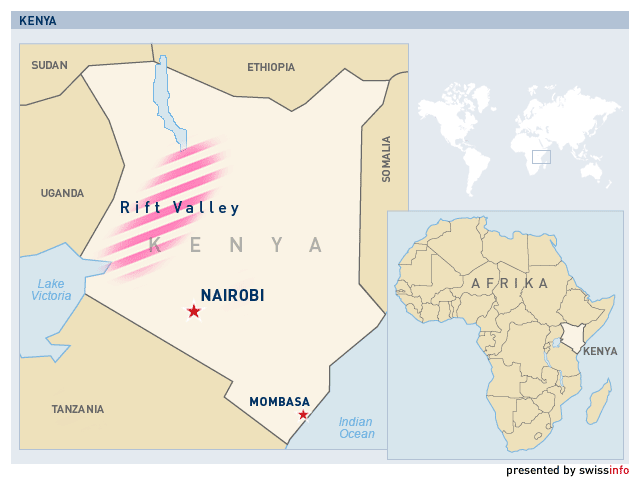
Kenyan violence rooted in “economic interests”

The violence that erupted following disputed national elections in Kenya is rooted in animosities dating back to the colonial era, says a Swiss expert on Africa.
Urs Wiesmann tells swissinfo about the ongoing unrest in Kenya that has led to nearly 800 deaths since the beginning of the year.
At the end of January former United Nations Secretary-General Kofi Annan agreed to negotiate between President Mwai Kibaki and his political opponent, Raila Odinga. The two sides are currently talking – a hopeful sign despite the grim situation, according to Wiesmann.
“Ninety-five per cent of all Kenyans are against violence,” he told swissinfo. “This opposition to violence has in recent weeks been putting increasing pressure on the political elite to come up with a solution.”
Wiesmann added that the debate over which side is in the right is actually less important than understanding the root causes.
“Behind all of this unrest are old conflicts that came to the surface during the presidential election in December,” he said.
“First, this is an argument over land and resources in the Rift Valley that dates back to the colonial era. Second, Kenya has grown relatively quickly and there is a clash between the rich and the poor. And third, this is a conflict about the political system.”
Simple tribal rivalries factor in the recent violence, Wiesmann says, but they are not necessarily the cause. He adds that while both sides are mobilising ethnicity and tradition, questions relating to the future prosperity and control over the frontier regions seem to be more salient this time around.
“It does look like an ethnic conflict, but economic interests are behind it,” he said.
Last straw
The battle lines here are drawn between the Luos and the Kikuyus – the tribe of President Kibaki, who apart from being the subject of various grievances by disenfranchised Luos has been accused of stuffing the ballot boxes in his party’s favour.
The results, described by European Union observers as “flawed”, appear to have been the last straw between the two sides, both of which have laid claim to land in the Rift Valley.
“The original inhabitants of this region during the colonial and post-colonial eras lost rights to the land, and new settlers came in and legally acquired it.”
But despite the renewal of old tensions, Kenya is not actually backsliding, Wiesmann says. Rather, it is on the cusp of modernisation.
“Kenya is [politically and economically] further ahead than most of Africa. What happens here will send a signal across the entire continent.”
Compared with other countries in the region, Kenya ranks high in key indicators including education, press freedom and standard of living. Moreover, its economy has undergone modernisation and is performing strongly. Its annual growth rate stands at roughly six per cent and it boasts a relatively high per capita income.
Focused development
Wiesmann’s current research is a partnership with Kenyan and Tanzanian colleagues. Working with the Swiss National Science Foundation’s North-South Institute, they are focusing on development collaboration, seeking interdisciplinary solutions to complex challenges surrounding the use of land, water and resources.
Wiesmann criticises traditional conceptions of development within Switzerland and Europe, labelling them as spurious and one-dimensional approaches to fighting poverty. Aid is indeed needed for countries in serious trouble, he says, but for countries as developed as Kenya, the issue is rather education, research and the development of organisations involved in civil society.
“As Kenya began developing in the 1990s, Switzerland withdrew from the country for exactly that reason,” Wiesmann said. “This approach to development is obsolete.”
Today, Kenya receives less conventional aid and more is invested in building global partnerships.
“It is entirely in the interest of Switzerland and all of Europe that civil and democratic governments emerge in Africa,” he said.
He hoped that African countries would no longer be relegated as surrogates within larger empires or be exploited by external political and economic actors.
swissinfo, based on a German article by Susanne Schanda
Post-colonial Africa has a reputation for authoritarian rulers, rigged elections and violent outcomes. In spite of this, countries including South Africa, Liberia and Sierra Leone have had free and fair elections.
After the presidential elections in Kenya on December 27, there were reports of irregularities. The European Union declared the results invalid.
The incumbent, President Mwai Kibaki, was hastily declared the victor and sworn in, leaving no legal recourse for parties disputing the outcome.
The political dispute soon became connected with other grievances in the Rift Valley. The province is a swathe of land stretching between the northern and southern borders on Kenya’s western side. The largest and most economically robust of the country’s seven provinces, it touches Uganda on the west and is home to the regional hub of Eldoret, the epicentre of the post-election violence earlier this year.
Violence spread across the country to the slums of Nairobi and on to the edge of the port city and tourist hub of Mombasa.
Urs Wiesmann is a geographer, a professor in Switzerland and Kenya and serves as co-director of the Centre for Development and Environment at the University of Bern.
In the late 1980s he spent four years engaged in development work in Kenya.
When he’s not working at Bern University, Wiesmann spends his time in Nanyuki, 200 kilometres north of the capital Nairobi.
Wiesmann is also the deputy director of the North-South Institute, funded in part by the Swiss National Science Foundation and the Swiss Agency for Development and Corporation.


In compliance with the JTI standards
More: SWI swissinfo.ch certified by the Journalism Trust Initiative






























You can find an overview of ongoing debates with our journalists here . Please join us!
If you want to start a conversation about a topic raised in this article or want to report factual errors, email us at english@swissinfo.ch.